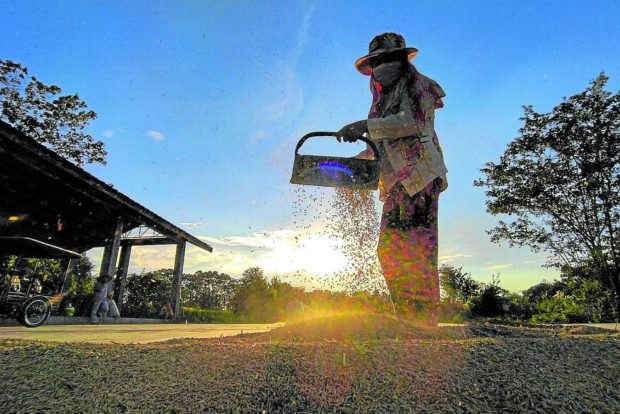
PREDAWN TASK During harvest season, rice farmers are usually up before daybreak to collect and store dried “palay” for hulling and milling. Farmers, like this woman in Balungao, Pangasinan, now face a threat from imported agricultural products that will flow into the country under the new free trade pact among nations in the Asia-Pacific. —RICHARD BALONGLONG
DAGUPAN CITY—The country’s agricultural groups urged the government to step on the brakes and review the condition of the farm sector before signing up to a new Asia-Pacific free trade deal that will worsen the already dire state of domestic food producers.
Samahang Industriya ng Agrikultura (Sinag) urged the Senate to suspend the ratification process for the Regional Comprehensive Economic Partnership (RCEP), a free trade agreement among the Asia-Pacific nations of Australia, Brunei, Cambodia, China, Indonesia, Japan, Laos, Malaysia, Myanmar, New Zealand, Singapore, South Korea, Thailand, Vietnam and the Philippines.
The Senate should instead review how the country’s farmers operated under the 1994 General Agreement on Tariffs and Trade (GATT) that was enforced by the World Trade Organization (WTO), the group said.
The RCEP could further cripple the agriculture sector, it warned in a statement on Saturday.
During his Oct. 28 visit to Baguio City, Agriculture Secretary William Dar acknowledged that farming remains the “most underfunded and underinvested” sector in the country, which Congress must address given that farmers “grow the food all Filipinos consume.”
The proposed P5-trillion budget for 2022 only allocated 1.6 percent (about P8 billion) for agriculture, which has been the condition of state funding for farming in the last 35 years, Dar said on the sidelines of a forum here on the Rice Competitiveness Enhancement Fund.
Other Southeast Asian countries are ahead of the Philippines because their agriculture sectors get between 4 to 6 percent of their annual budgets, Dar said.
Worse off
Sinag said those pushing for the RCEP were the same “experts” who backed the GATT, which advocates had projected to increase the country’s annual agricultural export earnings by P3.4 billion and the annual value added of agriculture by P60 billion. These advocates now claimed that the RCEP would create an additional 500,000 jobs annually and improve the balance of trade in agricultural products, Sinag added.
“[But] 27 years after, why was there such a contrast between the rosy predictions and the dismal outcomes? In private exchanges, these ‘experts’ expressed surprise that people still remembered their erroneous projections,” Sinag said.
“We are worse off today as we have an agriculture department that pushed for the wanton increase of import allocation of agricultural products and railroaded the reduction of tariff for imported agricultural products,” it said.
Sinag said the same experts were responsible for the reduced domestic support for agriculture, which was not required by WTO rules.
“How much is the increase in annual agricultural export earnings? How much is the annual gross value added of agriculture? How many jobs were created annually? What are the indications of an improved balance of trade in agricultural products, if any? Unless the answers to these questions are positive, why would we want to further cripple the local agriculture sector by joining the RCEP?” the group asked.
Need to do more
Instead of joining the RCEP, Sinag said the government must make “food self-sufficiency and significant rural livelihood opportunities the explicit starting point of the country’s food and agriculture program [to] make the agriculture industry the true engine of national development and real economic growth.”
Dar has himself acknowledged the need to make farmers and fisherfolk more competitive, saying that “if this sector can have sufficient budgetary support from the government, then we can entice the private sector to invest.”
The coronavirus pandemic also broke down the world supply chain, revealing the necessity for countries to be food self-sufficient, Dar said.
Increased funding is also important now because farms suffer from extreme and traumatic weather disturbances due to climate change, he added.
During his talk with Benguet farmers, however, Dar vouched for the Rice Tariffication Law (Republic Act No. 11203) as one of agriculture’s “necessary reforms” because it generates funds that can be routed back to food production.